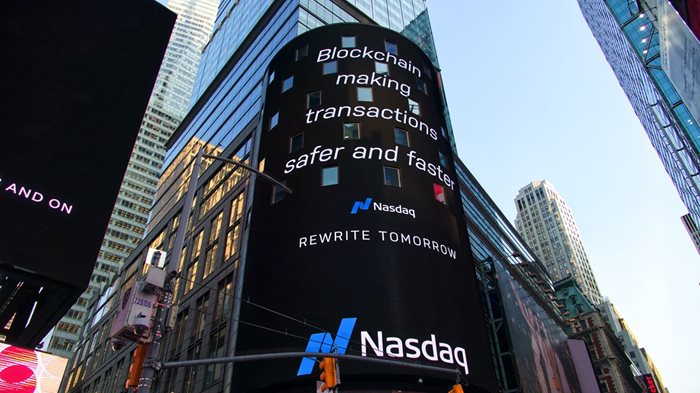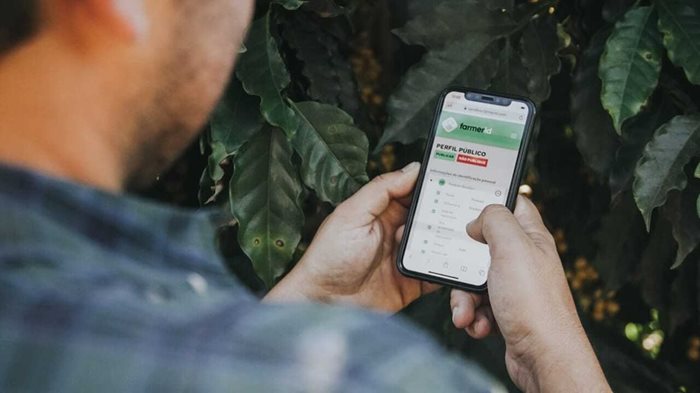5THWAVE examines how greater international cooperation and innovative technologies are enabling some of the world’s most marginalised coffee farmers to build stronger business practices and capture a greater share of the coffee value chain. In part two we explore blockchain technology and coffee supply chain traceability and ask what the future could look like for coffee farmers at origin. Catch up on part one
here.

A billboard in Times Square, New York, extolling the virtues of blockchain | Photo credit: Pascal Bernardon
Working in the blockchain gang
AgUnity’s Founder, David Davies observes that even as coffee is increasingly premiumised, marketing designed to monetise high-quality coffee often falls short of increasing the value of the coffee farmers produce, especially among marginalised smallholders.
“Coffee marketing has been very successful at squeezing more value from consumers in developed countries, but very little of that is going back to the farmer,” he says.
International Coffee Organization (ICO) data shows that in the 2016-17 coffee season, Ethiopia exported around 221,000 metric tonnes of coffee at an estimated value of more than $860m. While the mark-up on specialty coffee crops is often considerable in developed markets, the average annual income for an Ethiopian coffee farming family remains less than $1,000, and sometimes much less.
According to AgUnity, 1.8 billion people around the world live in poverty because they lack access to basic services, such as banking, digital identities, communication and documentation.
Technology, particularly blockchain, has been the driving force behind the platform’s work at origin and can be an eloquent solution for tracking data and illuminating obscurity in complex coffee supply chains.
"In the next 5-10 years, you’re going to see almost 100% of coffee supply chains becoming traceable"
– David Behrends, Founder and President, Farmer Connect
A blockchain ledger also provides a secure and traceable way of recording transactions and other data points that can enable farmers to catalyse more value from supply chains.
AgUnity’s work begins by giving farmers a
$50 smartphone, which can be used to generate digital identities, track transactions with buyers and cooperatives, and access the blockchain ledger. QR codes offer offline solutions for farmers living in remote areas with limited or zero connectivity.
“Farmers, especially women, often encounter significant problems when receiving cash payment for coffee cherries at washing stations. The whole village will know they’ve returned with cash, robberies occur, and it can create domestic violence,” says Davies.
“Coffee can also be a particularly problematic crop because farmers will often only deliver a couple of times a year, so that’s most of their cash income.”
Instead of relying on insecure and largely undocumented cash transactions, by transacting on a simple phone app the exact weight and price of a harvest is recorded, with the funds stored digitally and out of harm’s way.
“That removes a lot of risk from the system and is probably one of the most empowering aspects of what we do,” says Davies.
.JPG.aspx?lang=en-GB&width=700&height=466)
Coffee farmers in Papua New Guinea with smartphones supplied by AgUnity | Photo credit: AgUnity
Launched in 2019, Farmer Connect’s
Farmer ID platform also enables coffee farmers to build a digital presence and harness the commercial potential of their own operational data. Its platform means coffee farmers, coffee traders and roasters, can all use the blockchain ledger to verify claims made about coffee prices or sustainability initiatives. Crucially, this means no entity in the supply chain can self-certify. This, in turn, opens the door to meaningful industry dialogue about living income, improving yields and enhancing sustainability practices, says David Behrends, Founder and President, Farmer Connect.
“The Farmer ID solution means farmers can create a digital identity,” says Behrends.
“If you’re a farmer in Colombia, you can use the FSC number, if you’re in another country you can use the national ID number. If none of those are possible, farmers can create their own digital ID owned by them.”
Digital identities mean many farmers can for the first time produce records of production, transactions and income, enabling them to open bank accounts. This is hugely beneficial for largely cash-based farm businesses, creating greater transaction security and opportunities to access regulated credit markets.
Digital IDs can also benefit coffee companies seeking to verify supply chains or attract environmentally conscious investors. “If a farmer invests in good agriculture practices, we want to issue them a digital credential that goes under their ID. Those digital credentials form part of the proof that roasters are buying coffee from responsible supply chains.”
While supply chain transparency is increasingly commonplace in the specialty coffee market, scaling supply chain verification tools to the much larger premium and commodity markets will be the next big challenge for the technology.

A view of the Farmer ID interface | Photo credit: Farmer Connect
Demonstrating the potential of traceable supply chains among scaled premium coffee companies, 2020 saw Farmer Connect partner with major coffee companies, including J.M. Smucker Company, Jacob’s Douwe Egberts and UCC Coffee Company.
In March 2021, Italian coffee roaster Massimo Zanetti adopted the Farmer Connect blockchain platform for the launch of its Segafredo Storia sustainable coffee brand. In April 2021, Dutch retail giant HEMA became one of the
first major retail chains to adopt Farmer Connect’s Thank My Farmer app for its own-brand coffee products.
“The small always inspires the large,” says Behrends. “Twenty years ago we didn’t have the detailed health and nutritional information we have today in supermarkets. In the next 5-10 years, you’re going to see almost 100% of coffee supply chains becoming traceable.”
What the future could look like
There are no easy fixes for the coffee price crisis, which is rooted in entrenched and highly complex trading models.
“There is no one size fits all solution, we must work on many different issues simultaneously,” says the ICO’s Executive Director José Sette. “One of my favourite quotes is from American journalist HL Mencken, who said: ‘For every complex human problem, there is an answer that is clear, simple and wrong’.
“There is an immense amount of work to be done. But I think in many ways we are better off than we were 30-40 years ago. Having lived through the regulated era, despite the deficiencies we have today, it is much better to work in the free market than under tight regulation,” Sette adds.
“In the future, retailers in developed markets could start paying coffee farmers in real time"
– David Davies, Founder of AgUnity
Increasingly, greater international cooperation and the application of radical technology, is bridging the gap between consumers, roasters, retailers and coffee producers as never before.
“We’re already seeing a movement toward direct communication, between roasters and farmers and cooperatives,” says Behrends.“The more we can prove about the coffee we’re buying, the more we’re de-commoditising the commodity.”
AgUnity’s Davies also foresees a world where roasters and retailers connect directly with coffee farmers, without the need for labour intensive sourcing programmes. In June 2021 his organisation released AgriUT, a blockchain-powered reward token that securely connects consumers to organisations that produce ethically sourced products via a QR code on packaging. This will enable coffee consumers, retailers and producers to form like-minded communities of ethically driven coffee consumption.
“In the future, retailers in developed markets could start paying coffee farmers in real time as goods are handed over. This removes more risk in the supply chain and allows roasters to start rewarding the farmer directly. When something like that happens you really start to move the needle,” Davies says.
Initiatives like these offer a glimpse of a world where coffee farmer profitability no longer hinges on the goodwill of businesses, but instead can be guaranteed at origin.
Strengthening bonds between disconnected areas of the coffee value chain is a powerful tool to ensure consumer appetite for higher quality coffee translates into better returns for coffee farmers – and strengthens the resilience of quality coffee production globally.
This article was first published in Issue 7 of 5THWAVE magazine.
Subscribe to 5THWAVE to receive each edition in print and digitally or sign up to our newsletter and be the first to read the latest articles and updates on World Coffee Portal research
